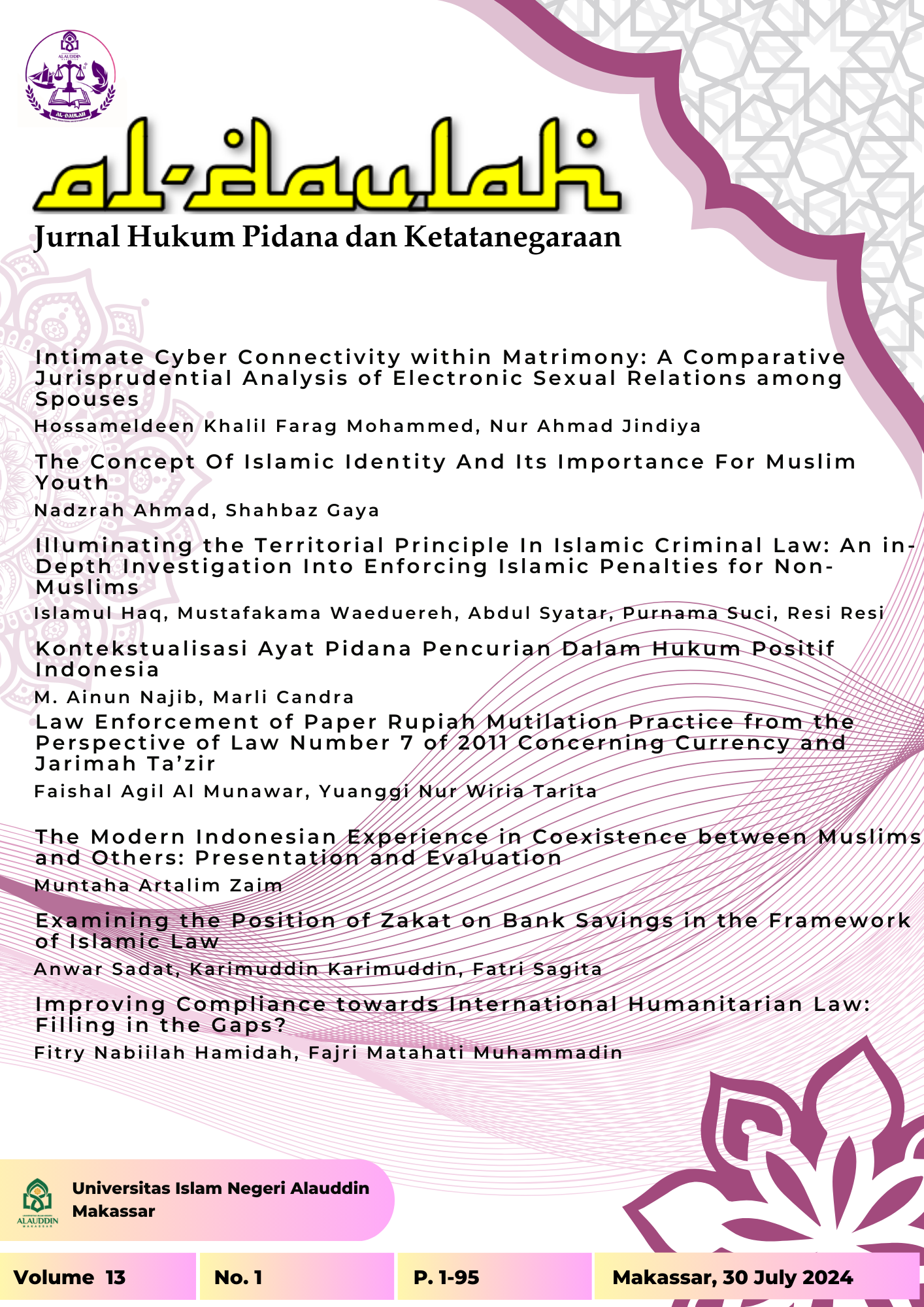Illuminating the Territorial Principle In Islamic Criminal Law: An in-Depth Investigation Into Enforcing Islamic Penalties for Non-Muslims
Abstract
This article presents a comprehensive analysis of the Territorial Principle in Islamic Criminal Law, focusing on enforcing Islamic punishments for non-Muslims. The research delves into controversies surrounding the extent to which the jurisdiction of Islamic law is applied in specific regions, particularly concerning the treatment of non-Muslim individuals under the governance of an Islamic state. This literature review will explore reading materials related to the territorial principle and its application in Islamic criminal law concerning non-Muslims. The findings of this research reveal that the theories presented by Imam Abu Hanifah and Abu Yusuf in the Hanafi school of thought offer distinct perspectives on the territorial application of Islamic criminal law. Imam Abu Hanifah asserts that the full implementation of Islamic criminal law is confined to Muslim territories, with punishments applicable to both Muslim and non-Muslim individuals within these boundaries. However, outside these territories, he argues that Islamic law is not obligatory, emphasizing the role of the imam's authority. Meanwhile, the perspectives of Imam Malik, asy-Syafi'i, and Imam Ahmad propose a universal application of Islamic law, emphasizing the legal subject's responsibility rather than geographical boundaries, thereby prohibiting Muslims from committing legal violations anywhere
References
Abd-Allah, Umar F, Living Islam with Purpose (Tabah Foundation Abu Dhabi, 2012)
Abubakar, Ali, ‘Kedudukan Non Muslim Dalam Qanun Jinayat’ (Dinas Syariat Islam Aceh, 2022)
Al-Bukhari, Abu ’Abdullah Muhammad Ibnu Ismai’l, Al-Jami’ Al-Sahih, Cet. I (al-Qahirah: Dar al-Salafiyyah, 1422)
Ash-Shiddieqy, Muhammad Hasbi, ‘Hukum Antar Golongan’, Semarang: Pustaka Rizki Putra, 2001
Bakri, N, ‘The Territorial Principles in Islamic Criminal Law: Should A Non-Muslim Be Punished’, International Journal of Innovation, Creativity and Change, 13.8 (2020), 486–504
Darmalaksana, Wahyudin, ‘Analisis Perbandingan Asas Teritorialitas Dan Asas Non-Teritorialitas Dalam Pemikiran Hukum Islam’, Jurnal Perspektif, 7.1 (2023), 1–8
Falah, Muhammad Fajrul, ‘Egalitarianisme Muslim Dan Nonmuslim Dalam Kitab Al-Musāwah Al-Insāniyyah Karya ‘Ali Jum’Ah’, Syariah: Journal of Fiqh Studies, 1.1 (2023), 1–20
Göktaş, Vahit, and Saeyd Rashed Hasan Chowdury, ‘Freedom Of Religion, Faith and Religious Tolerance in Bangladesh: A Case Study on The Islamic Mysticism/Bangladeş’te Din Özürlüğü, İnanç ve Dinî Hoşgörü: İslâm Tasavvufu Üzerine Örnek Bir Araştırma’, Disiplinlerarası Sosyal Bilimler Dergisi, 5, 2019, 41–67
Hakim, Muhammad Lutfi, and Khoiruddin Nasution, ‘Accommodating Non-Muslim Rights: Legal Arguments and Legal Principles in the Islamic Jurisprudence of the Indonesian Supreme Court in the Post-New Order Era’, Oxford Journal of Law and Religion, 11.2–3 (2022), 288–313
Halim, Abdul, ‘Non-Muslims in the Qanun Jinayat and the Choice of Law in Sharia Courts in Aceh’, Human Rights Review, 23.2 (2022), 265–88
Hanafi, Ahmad, ‘Asas-Asas Hukum Pidana Islam’, (No Title), 1967
Jafar, Wahyu Abdul, ‘Analisis Asas Hukum Pidana Islam Dan Asas Hukum Pidana Di Indonesia’, Al-Istinbath: Jurnal Hukum Islam, 1.1 June (2016), 25–44
Jamhuri, Muhammad, ‘Humanisme Sebagai Nilai Pendekatan Yang Efektif Dalam Pembelajaran Dan Bersikap, Perspektif Multikulturalisme Di Universitas Yudharta Pasuruan’, Jurnal Al-Murabbi, 3.2 (2018), 317–34
Kadivar, Mohsen, ‘Freedom of Religion and Belief in Islam’, Islam and Religious Diversity. Critical Concepts in Islamic Studies, 2006, 198–220
L. Amin Widodo, Fiqh Siyasah Dalam Hubungan Internasional (Yogyakarta: Tiara Wacana, 1994)
Maghen, Ze’ev, ‘Theme Issue: The Interaction between Islamic Law and Non-Muslims: Lakum Dinukum Wa-Li Dini’, Islamic L. & Soc’y, 10 (2003), 267
Melayu, Hasnul Arifin, Mohammad Zawawi Abubakar, and Norruzeyati Che MohammadNasir, ‘Minorities in the Shari’a Territory: The Position of Non-Muslims in Aceh’s Jinayat Law [Minoritas Di Wilayah Syariat: Kedudukan Non Muslim Dalam Qanun Hukum Jinayat Aceh]’, Legitimasi: Jurnal Hukum Pidana Dan Politik Hukum, 10.1 (2021), 129–49
Mussap, Alexander J, ‘Strength of Faith and Body Image in Muslim and Non-Muslim Women’, Mental Health, Religion and Culture, 12.2 (2009), 121–27
Nassar, Ahmad E, ‘The International Criminal Court and the Applicability of International Jurisdiction under Islamic Law’, Chi. J. Int’l L., 4 (2003), 587
Peters, Rudolph, ‘Dar Al-Harb, Dar Al-Islam Und Der Kolonialismus’, in Shariʿa, Justice and Legal Order (Brill, 2020), pp. 418–27
Powell, Emilia Justyna, ‘Islamic Law States and the Authority of the International Court of Justice: Territorial Sovereignty and Diplomatic Immunity’, Law & Contemp. Probs., 79 (2016), 209
Puteh, Zainuddin, and Faisar Ananda Arfa, ‘Non-Muslim Sebagai Subjek Hukum Islam Dalam Konsep Mukallaf’, Legitimasi: Jurnal Hukum Pidana Dan Politik Hukum, 11.1 (2022), 78–93
Saeed, Abdullah, Freedom of Religion, Apostasy and Islam (Routledge, 2017)
Sarong, A Hamid, ‘Enforcing Islamic Law for Non-Muslims a Case Study of Indonesia’, Hamdard Islamicus, 10.4 (2018), 99–119
Syarif, Mujar Ibnu, ‘Political Discrimination against Non-Muslims in Contemporary Indonesia’, in 1st International Conference of Law and Justice-Good Governance and Human Rights in Muslim Countries: Experiences and Challenges (ICLJ 2017) (Atlantis Press, 2017), pp. 69–72
Tellenbach, Silvia, ‘Islamic Criminal Law’, The Oxford Handbook of Criminal Law, 2014, 248–68
Woods, Timothy J, ‘Islam, Peace and the Quest for Justice’, Theology, 109.852 (2006), 412–20
Copyright (c) 2024 Islamul Haq, Mustafakama Waeduereh, Purnama Suci, Resi Resi

This work is licensed under a Creative Commons Attribution 4.0 International License.
The authors of a work hold the copyright and grant the Al-Daulah: Jurnal Hukum Pidana dan Ketatanegaraan the right of first publication. The work is also licensed under the Creative Commons Attribution License (CC BY 4.0), which enables others to share the work while acknowledging the authorship and initial publication in the journal. The authors can make separate contractual agreements for the non-exclusive distribution of the published version of the work, such as by posting it to an institutional repository or editing it for a book, with an acknowledgment of its initial publication in this journal. Authors are allowed and encouraged to post their work online, such as in institutional repositories or on their website, before and during the submission process. This can lead to productive exchanges and greater citation of the published work.


